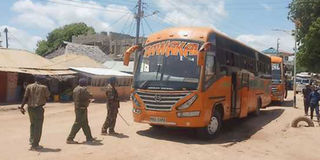Kenya shuts Somalia border as secessionist group raises eyebrows

Police officers inspect a bus plying the Lamu-Garsen road. The government has shut down its Kiunga border with Somalia. PHOTO | FILE | NATION MEDIA GROUP
What you need to know:
- County Police Commander Muchangi Kioi said his officers will now confiscate goods and prosecute those found to be flouting the ban.
- The government will be vetting the politicians’ financial accounts and their investments to check if they have laundered money.
Fears over a new secessionist outfit benefiting from contraband trade have fuelled Kenya’s swift move to shut down its border with Somalia.
On Tuesday, the Kiunga border point in Lamu County became the latest to be closed as Kenyan authorities argued they were blocking routes for smuggling, terror merchants and human trafficking.
County Police Commander Muchangi Kioi said his officers will now confiscate goods and prosecute those found to be flouting the ban, in an area that has already been red-pencilled for Al-Shabaab activity.
Only security agents will be allowed across the border point. “Apart from security concerns, we are also aware of human and narcotics trafficking. That must stop. It is now a crime and for those who do not know, the border remains closed until further notice,” said Mr Kioi.
“Those smuggling contraband items from Kenya into Somalia and vice-versa will have themselves to blame. We will destroy those items and close your shop. We will also arrest and prosecute you.”
VETTING
While Mr Kioi implements the government directive in Lamu, senior officials were meeting in Nairobi to discuss the emerging outfit known as the Northern Frontier District Independence Party, a mysterious movement whose members brand themselves as “freedom fighters”.
The meeting, which brought together security chiefs and diplomats, analysed the participation of certain politicians from the north eastern region in the group, and how smuggling is aiding the nascent secessionist claim.
Some local politicians, most of who lost in the 2017 General Election, have been fingered for holding meetings among the Somali community in Kenya, Somalia and Ethiopia — where the idea of secession was reintroduced.
As part of the crackdown, the Nation learnt, the government will be vetting the politicians’ financial accounts and their investments to check if they have laundered money.
SOCIO-POLITICAL PARTY
The group, whose actual membership is unknown, has recently been active on social media, reviving the old claim for secession, which was crushed at Kenya’s independence.
Garissa, Wajir, Mandera and sometimes Marsabit and Isiolo, are often collectively known as Northern Frontier District, borrowing from a colonial tag when the British administered the region from a distance because of its harsh weather.
On Sunday, the group posted on Twitter a message rallying members to support separation of the counties from Kenya into an independent country, this time stopping short of saying they will join Somalia (as the pre-independence demand was then).
“We are a social political party that is proposing an independent republic of NFD, free from Kenya and free from Somalia,” the group said in a statement.
“This movement is a result of continuous oppression from Kenya and Al-Shabaab. Al-Shabaab attacks KDF; KDF attacks innocent NFD. No more,” the group added without substantiating.
ATTACKS
While self-determination is guaranteed in the law, officials feel the targeting of security agencies — the police and the Kenya Defence Forces — warrants an urgent crackdown.
The move on Lamu means the entire Kenya-Somalia border points from Mandera, Dhobley and down to Kiunga are officially shut.
Last week, fishers were banned from seeking catch in Lamu waters, and security patrols increased.
In 2014, then Interior Cabinet Secretary Joseph Nkaissery shut the Mandera crossing, due to increase in terror activities in the North Eastern region.
It had followed the killing of 60 people in cold blood in two different attacks by Al-Shabaab.
A bus was attacked while heading to Nairobi and 28 people were killed, most of them teachers and health workers.
Ten days later, 36 quarry workers were killed at night at their place of work. The government declared the border closed to reduce free entry and exit of people into Mandera.







